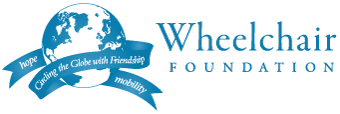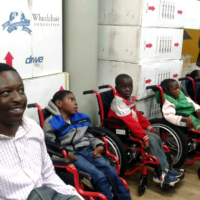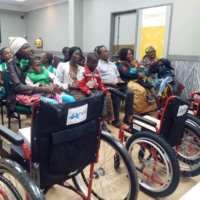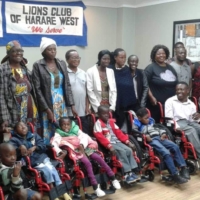CLOCKWISE FROM TOP: >>> In Tanzania, along “Mosquito’s River,” Conservation Foundation Trust works with local tribal communities to reach disabled children, adults, and elderly in an area seldom visited by aid organizations. Traditional rural trade routes meet in areas where multiple Tribes have settled. In villages like Mto Wa Bbu, like any major cultural hub, people from all stations of life do business together and take part in caring for one another. >>> Lions Club of Harare West presents wheelchairs to individuals and institutions in need of wheelchair mobility. >>> Recipients and their families gather to celebrate the gift of a wheelchair. >>> Lots of excited and happy recipients take a moment to thank the Lions for their efforts to assist the people of Zimbabwe. >>>
For more than 20 years Wheelchair Foundation has been providing wheelchairs to partner organizations whose specialty is to reach deep into rural areas not frequented by other aid organizations.
Mto Wa Mbu is a small village a little over 75 miles due west from Arusha, Tanzania. The name “Mto Wa Mbu” means “Mosquitos’ River.” Here locals grow bananas and host tourists who pass through on their treks to Lake Manyara, Ngorongoro Crater, and Serengeti National Park. The populace is made up of members of some 150 unique tribes with nearly as many languages spoken.
Conservation Foundation Trust (CFT) is committed to supporting communities in and around wildlife reserves and protected areas. The community support is part of a partnership with the villages to conserve the natural resources and ensure that they receive tangible benefits from the sustainable use of wildlife in the protected areas. On behalf of Wheelchair Foundation, CFT was able to distribute 20 wheelchairs to the disabled people of Mto Wa Mbu bordering Monduli Juu Open Area.
South of Tanzania, in Zimbabwe, the Lions Club of Harare West has been a wheelchair distribution partner helping to reach the disabled near Harare. Although grateful for the privilege to serve their community through assistance rendered through the receipt of wheelchairs, their work has revealed greater demand than they have supplied. Economic constraints within the country and the early effects of the global pandemic may very well continue to increase the demand for wheelchairs.
As with many distribution efforts, in the process of identifying individuals in need of a wheelchair, when the word spreads, suddenly the demand rises above the number of wheelchairs available. Many partner organizations maintain lists of people in need, in the hope that more wheelchairs will arrive. In Africa, there is always a need. It may just take more effort to reach those waiting for relief.
We are thankful for our partners, their families, and our donors, all of who keep making our work possible.





 Ameca, Mexico
Ameca, Mexico

 Our elders are living longer and their sheer numbers will create a much greater demand for mobility assistance devices like wheelchairs. Many who need one, will not be able to afford one. In addition to neurological conditions like strokes, multiple sclerosis, Parkinson’s, and post-polio syndrome, they will be heavily impacted by orthopedic ailments such as arthritis and diabetes amputations. Knees and hips will also be wearing out – even for people that were superb athletes in their youth – as was the case with my father who needed a walker and cart the last 7 years of his life.
Our elders are living longer and their sheer numbers will create a much greater demand for mobility assistance devices like wheelchairs. Many who need one, will not be able to afford one. In addition to neurological conditions like strokes, multiple sclerosis, Parkinson’s, and post-polio syndrome, they will be heavily impacted by orthopedic ailments such as arthritis and diabetes amputations. Knees and hips will also be wearing out – even for people that were superb athletes in their youth – as was the case with my father who needed a walker and cart the last 7 years of his life.
